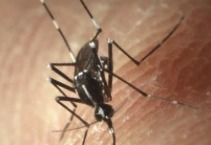There are, according to West Berkshire’s public health officials, no invasive mosquitos on the M4 corridor.
The national mosquito project, which monitors for invasive mosquitoes that may increase the risks of disease transmission, was conducted over the summer.
Monitoring along the M4 corridor ran until the end of September.
They have been on the look out for a type of mosquito called Aedes albopictus – deemed a major public health concern because it is a known vector for diseases such as dengue, chikungunya, and Zika virus.
Originally from Southeast Asia, it has spread globally due to climate change, trade, and travel.
In Europe, it has contributed to local outbreaks of dengue in Spain, France, and Italy. Preventing its establishment in the UK requires coordinated surveillance, early detection, and rapid control measures, making seasonal monitoring essential for public health protection.
To address this threat, the UK Health Security Authority co-ordinates invasive mosquito surveillance, and works closely with local authorities and port health, to run mosquito traps at high-risk sites. In West Berkshire’s case – the public protection partnership.
The programme uses ovitraps. These are water-filled traps designed to attract egg-laying female mosquitoes, particularly the Tiger mosquito. These traps are checked biweekly from June to October, a period when mosquito activity is highest. Collected samples are then sent to UKHSA for analysis.
The UK’s invasive mosquito surveillance began in 2010, and the first Aedes albopictus eggs were detected in 2016 at a truck stop in Kent. Surveillance is primarily conducted by local health and port health authorities, focusing on high-risk locations such as ports, airports, service stations, and urban centres.
If invasive mosquito eggs are found, there is a National Contingency Plan for Invasive Mosquitoes, and an incident would be established by the Health Protection Team.
An inspection of 300m radius around the site for potential breeding grounds, such as puddles, buckets, tyres, and other objects that can hold water, would take place and any identified breeding sites would be removed, drained, or treated to prevent the eggs from hatching.
UKHSA Medical Entomology entomologists would deploy adult mosquito traps to monitor the area. If adult mosquitoes are detected, targeted treatments — such as source reduction, insecticides or biological controls — would be used to reduce their numbers. In locations where standing water cannot be eliminated, a special film would be applied to prevent egg hatching.
The local EHO team would collaborate with businesses and residents to raise awareness and provide guidance on eliminating standing water to reduce mosquito breeding risks. The area would be monitored for several weeks to ensure that the mosquitoes do not spread or establish a permanent population.
But thankfully, West Berkshire is currently free of the troublesome biters.
























